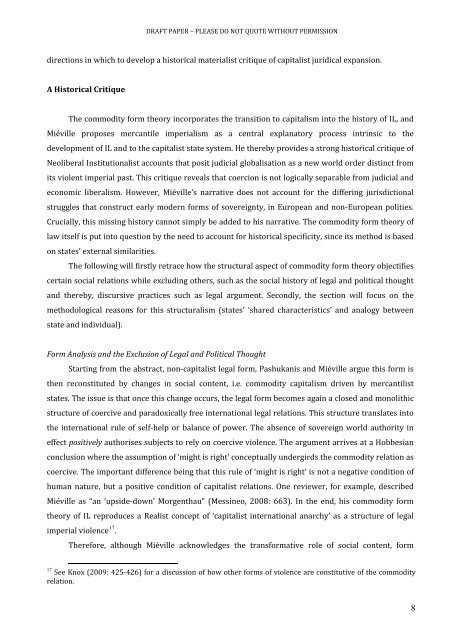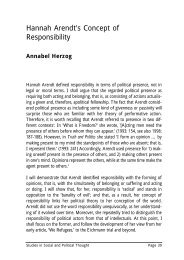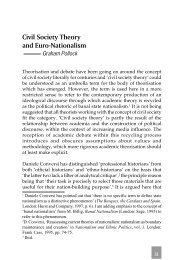Historical Materialism and International Law - University of Sussex
Historical Materialism and International Law - University of Sussex
Historical Materialism and International Law - University of Sussex
You also want an ePaper? Increase the reach of your titles
YUMPU automatically turns print PDFs into web optimized ePapers that Google loves.
DRAFT PAPER – PLEASE DO NOT QUOTE WITHOUT PERMISSION<br />
directions in which to develop a historical materialist critique <strong>of</strong> capitalist juridical expansion.<br />
A <strong>Historical</strong> Critique<br />
The commodity form theory incorporates the transition to capitalism into the history <strong>of</strong> IL, <strong>and</strong><br />
Miéville proposes mercantile imperialism as a central explanatory process intrinsic to the<br />
development <strong>of</strong> IL <strong>and</strong> to the capitalist state system. He thereby provides a strong historical critique <strong>of</strong><br />
Neoliberal Institutionalist accounts that posit judicial globalisation as a new world order distinct from<br />
its violent imperial past. This critique reveals that coercion is not logically separable from judicial <strong>and</strong><br />
economic liberalism. However, Miéville’s narrative does not account for the differing jurisdictional<br />
struggles that construct early modern forms <strong>of</strong> sovereignty, in European <strong>and</strong> non-European polities.<br />
Crucially, this missing history cannot simply be added to his narrative. The commodity form theory <strong>of</strong><br />
law itself is put into question by the need to account for historical specificity, since its method is based<br />
on states’ external similarities.<br />
The following will firstly retrace how the structural aspect <strong>of</strong> commodity form theory objectifies<br />
certain social relations while excluding others, such as the social history <strong>of</strong> legal <strong>and</strong> political thought<br />
<strong>and</strong> thereby, discursive practices such as legal argument. Secondly, the section will focus on the<br />
methodological reasons for this structuralism (states’ ‘shared characteristics’ <strong>and</strong> analogy between<br />
state <strong>and</strong> individual).<br />
Form Analysis <strong>and</strong> the Exclusion <strong>of</strong> Legal <strong>and</strong> Political Thought<br />
Starting from the abstract, non-capitalist legal form, Pashukanis <strong>and</strong> Miéville argue this form is<br />
then reconstituted by changes in social content, i.e. commodity capitalism driven by mercantilist<br />
states. The issue is that once this change occurs, the legal form becomes again a closed <strong>and</strong> monolithic<br />
structure <strong>of</strong> coercive <strong>and</strong> paradoxically free international legal relations. This structure translates into<br />
the international rule <strong>of</strong> self-help or balance <strong>of</strong> power. The absence <strong>of</strong> sovereign world authority in<br />
effect positively authorises subjects to rely on coercive violence. The argument arrives at a Hobbesian<br />
conclusion where the assumption <strong>of</strong> ‘might is right’ conceptually undergirds the commodity relation as<br />
coercive. The important difference being that this rule <strong>of</strong> ‘might is right’ is not a negative condition <strong>of</strong><br />
human nature, but a positive condition <strong>of</strong> capitalist relations. One reviewer, for example, described<br />
Miéville as “an ‘upside-down’ Morgenthau” (Messineo, 2008: 663). In the end, his commodity form<br />
theory <strong>of</strong> IL reproduces a Realist concept <strong>of</strong> ‘capitalist international anarchy’ as a structure <strong>of</strong> legal<br />
imperial violence 17 .<br />
Therefore, although Miéville acknowledges the transformative role <strong>of</strong> social content, form<br />
17 See Knox (2009: 425-426) for a discussion <strong>of</strong> how other forms <strong>of</strong> violence are constitutive <strong>of</strong> the commodity<br />
relation.<br />
8
















